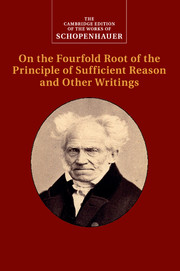Book contents
- Frontmatter
- Contents
- General Editor’s Preface
- Editorial Notes and References
- Introduction
- Notes on Text and Translation
- Chronology
- Bibliography
- Collation of the Two Editions of On the Fourfold Root
- 1 On the Fourfold Root of the Principle of Sufficient Reason
- 2 On Vision and Colours
- 3 On Will in Nature
- Glossary of Names
- Index
First Chapter - Introduction
Published online by Cambridge University Press: 30 June 2022
- Frontmatter
- Contents
- General Editor’s Preface
- Editorial Notes and References
- Introduction
- Notes on Text and Translation
- Chronology
- Bibliography
- Collation of the Two Editions of On the Fourfold Root
- 1 On the Fourfold Root of the Principle of Sufficient Reason
- 2 On Vision and Colours
- 3 On Will in Nature
- Glossary of Names
- Index
Summary
THE METHOD
Plato, the divine, and the amazing Kant unify their impressive voices in the recommendation of a rule for the method of all philosophizing, and indeed of all knowledge in general. They say that one should comply with two laws equally, that of homogeneity and that of specification, but not the one to the detriment of the other. The law of homogeneity enjoins us through attention to the similarities and correspondences among things, to comprehend species, and to unify these into genera, and these into families until we at last arrive at the supreme, all-encompassing concept. Since this law is a transcendental one, essential to our reason, it presupposes that nature is in agreement with it, which presupposition is expressed in the old rule: ‘entities are not to be multiplied without necessity’. – In contrast, Kant expresses the law of specification as: ‘the varieties of entities are not to be diminished rashly.’ It demands that we clearly distinguish among genera unified under an all-encompassing concept of a family and again among the higher and lower species comprehended under these genera, guarding against making any kind of leap by directly subsuming the lower species, or even the completely individual, under the concept of a family, while any concept of a family is still capable of a classification into sub-classes and yet none reaches down to mere intuition. Kant teaches that both laws are transcendental a priori principles of reasona postulating correspondence between things and the laws themselves, and Plato seems to express the same in his own way, as he says these rules, to which all sciences are indebted for their origin, were tossed down to us from the seat of the gods along with the fire of Prometheus.
ITS APPLICATION IN THE PRESENT CASE
I find the latter of these laws, such a powerful recommendation notwithstanding, applied too seldom to a fundamental principle of all cognition, the principle of sufficient reason. For although it has for a long time been frequently put in a general form, nonetheless, no one has distinguished among its highly differing applications, in each of which it acquires another meaning, and which, therefore, reveal its origin fromdiffering cognitive powers.
- Type
- Chapter
- Information
- Schopenhauer: On the Fourfold Root of the Principle of Sufficient Reason and Other Writings , pp. 7 - 10Publisher: Cambridge University PressPrint publication year: 2012

